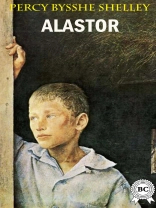The poem was without a title when Shelley passed it along to his contemporary and friend Thomas Love Peacock.
Peacock suggested the name Alastor, which comes from Roman mythology. Peacock has defined Alastor as ‘evil genius’.
In Alastor the speaker ostensibly recounts the life of a Poet who zealously pursues the most obscure part of nature in search of ‘strange truths in undiscovered lands’, journeying to the Caucasus Mountains (‘the ethereal cliffs of Caucasus’), Persia, ‘Arabie’, Cashmire, and ‘the wild Carmanian waste’. The Poet rejects an ‘Arab maiden’ in his search for an idealised embodiment of a woman. As the Poet wanders one night, he dreams of a ‘veiled maid’. This veiled vision brings with her an intimation of the supernatural world that lies beyond nature. This dream vision serves as a mediator between the natural and supernatural domains by being both spirit and an element of human love. As the Poet attempts to unite with the spirit, night's blackness swallows the vision and severs his dreamy link to the supernatural.
About the author
Percy Bysshe Shelley (4 August 1792 – 8 July 1822) was one of the major English Romantic poets.












